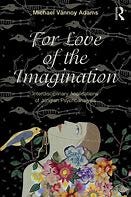I became a psychotherapist because I so love the imagination. William Blake says: “The Imagination is not a State: it is the Human Existence itself” (1976a: 522). That is exactly how I regard the imagination. For me, psychotherapy is essentially an affair of images – of how we imagine and, more important, reimagine ourselves. This process of imagining and reimagining ourselves I call the fantasy principle (Adams 2004). I consider the fantasy principle more fundamental than either the “pleasure principle” or the “reality principle.”
Why I became a psychotherapist is inseparable from what kind of psychotherapist I became. Although I esteem all of the different schools of psychoanalysis, I have a particular interest in the Jungian school and in the “Hillmanian” school of imaginal (or archetypal) psychology that James Hillman has elaborated (Adams 2008). Jungian analysis interests me because it emphasizes the imagination more than the other schools do.
Psychoanalysis – especially Jungian analysis – has enabled me to return to the imagination. To “return” to something, one must, of course, have “left” something. In a certain sense, I left the imagination. In another sense, however, it was not I who left the imagination (nor was it the imagination that left me). Rather, the imagination was left – left behind me for several years. According to Richard Kearney, the imagination may be leaving us all, not temporarily but permanently. In the postmodern period, Kearney says, we may be witnessing the death of imagination and attending, if not the funeral, at least a wake (1988). There may be such a general trend, but it is a quite particular experience that I wish to emphasize. Mary Watkins, who has described the many varieties of imaginal techniques in use historically in European and American psychology (1984) and who has championed the importance of what she calls “imaginal dialogues” (1986), criticizes certain psychologists (among them, Jean Piaget, Lev Vygotsky, and George Herbert Mead) for undervaluing or even devaluing the imagination. For such psychologists, the imagination is a developmental stage that we should grow out of as we grow into adulthood. For them, the imagination is merely a “phase” of childhood.



